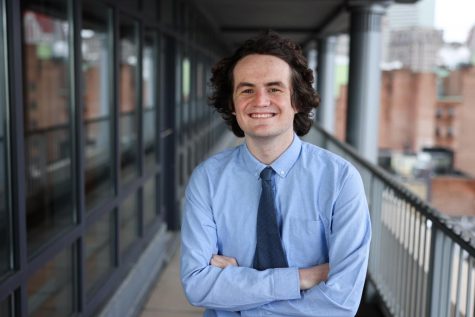Fox News’ Sean Hannity took the stage in Alpharetta, Georgia with Florida Gov. Ron DeSantis and California Gov. Gavin Newsom for what he dubbed the “Great Red vs. Blue State Debate” Nov. 30, promising to argue the policy merits between Democratic and Republican-run states.
The broadcast brought together two governors who’ve exchanged punches online to debate in person, a rare occurrence for politicians who aren’t competing in an election. However, Suffolk University’s Frank Irizarry, professor of public relations and director of debate, explained there is more behind the debate.
Irizarry said both governors came to the debate for very different reasons. While DeSantis is running for the Republican presidential nomination, Newsom stated publicly both before and during the debate he has no plans to run in 2024.
DeSantis hoped the debate would help him gain back ground from former President Donald Trump, who currently leads Republican polls, while Newsom essentially served as a surrogate for President Joe Biden, Irizarry said.
Despite DeSantis’s efforts, Irizarry doesn’t believe this debate will change much in the 2024 Republican primary.
“I don’t see this moving the dial at all,” he said. “If you’re a Trump supporter, [the debate] probably galvanized your support for Trump.”
On the flipside, Irizarry doesn’t think Newsom’s performance will help Democrats outside of himself. Irizarry blames this on the general ineffectiveness of surrogates in debates.
“I give Newsom a lot of credit. To go to Georgia and be on Fox News, with Sean Hannity as the host, that’s Hulk Hogan wrestling Steve Austin with Ric Flair as the special referee who’s giving him foreign objects,” said Irizarry.
One particular aspect of the debate that concerned Irizarry was the presentation of misleading data throughout Hannity’s questions. Despite Hannity’s affirmation that he would keep his personal beliefs separate, Irizarry felt the style and phrasing of questioning showed biases.
“I could tell that there was a lot of thought put into what is the way that we can maximize the struggle for Newsom and maximize blue state embarrassment and minimize red state,” Irizarry said.
The Poynter Institute of Media Studies shared Irizarry’s assessment, reporting the majority of graphs and statistics presented by Hannity were harsher on Democrat-led California than DeSantis’s state.
The report brought up Hannity’s injunction of his own beliefs in questions designated for Newsom, like questioning Biden’s cognitive abilities.
“Joe Biden is [experiencing] what I believe to be significant cognitive decline,” said Hannity. “And, in other words, it’s the toughest job in the world. Is Joe Biden experiencing this cognitive decline? Is it a danger to the country? Do you find when he speaks — what is your reaction to it?”
Irizarry felt Hannity’s handling of abortion-related questions showed his conservative interests ahead of the 2024 presidential election.
“Hannity was pressing Newsom on his thoughts on late-term abortions. Newsom wanted Hannity to press equally on the draconian laws that the state of Florida has, and Hannity did not want to talk about that at all,” Irizarry said.
“Women’s reproductive freedom is the third rail issue for Republicans going into the next election, and really the only thing that I think can save the Democrats,” he continued.
To Irizarry, the debate showed the biases behind the Fox network, which is often criticized due to its conservative leanings.
“Fox still likes us to believe in the illusion that they’re fair and balanced. They’re not, they like to perpetuate the ruse that they are,” he said. “Fox News is about an ideology. It’s about how the red state life is better than blue state life. So an opportunity to try to prove that argument is something Fox will take every time.”
By the end of the debate, Irizarry felt Newsom came out on top, specifically because of his statements on abortion.
“I think the winner of the debate is the person that was able to move a few voters in one direction and about the only people that I think got moved in that debate would have been moderate women voters who might be more swayed by abortion,” he said.
While an interesting spectacle, Irizarry said debates like this will remain rare.
“We’re not going to see too much more of this. Most politicians generally don’t like these debates, and they would rather avoid them and by and large,” he said. “We live in an immediate media ecosystem where [politicians] can largely avoid confrontation.”





















